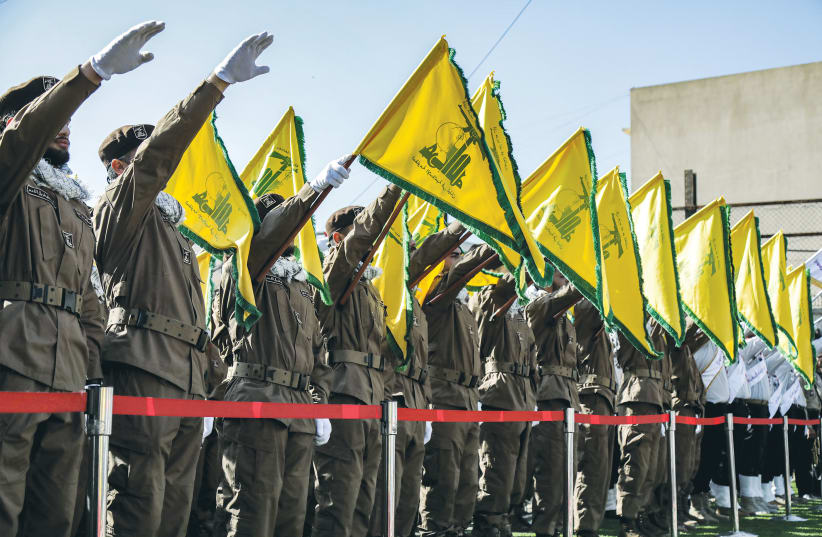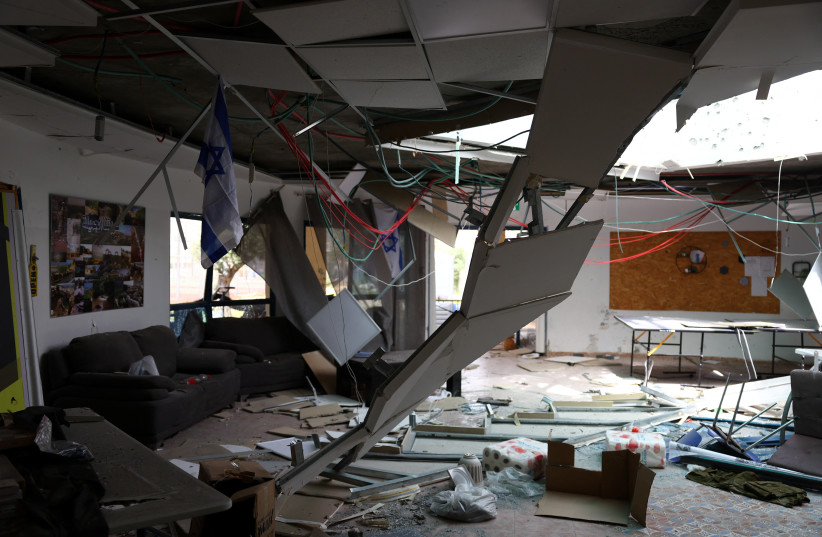Despite recent escalations with Hezbollah, which is exacting a heavy toll on the residents of northern Israel, the current situation has become a matter of routine - which is not part of the overall war scenario against Hezbollah.
Researcher Tal Beeri, head of the research department at the Alma Institute, told Maariv on Tuesday what a full-scale war in the North could resemble - including reports by Lebanese newspaper Al Akhbar that Israel would actively initiate war in the North.
"In the event that an all-out war breaks out, the Israeli front will absorb a volume of fire it has not ever been seen - including what was seen in 2006," Beeri predicts.
"Hezbollah's main firepower is missiles and rockets. In fact, Hezbollah's firepower can target the entire territory of the State of Israel with accurate shooting capability. The area that will mainly be under the large volume of fire is the entire northern area up to Haifa. In this area, the bulk of the fire will be from rockets of various types that are considered short-range. Thus, in the first week or two of the war, it will be almost impossible to lead a normal life," he predicted.
According to the research institute's estimates, Hezbollah has 150,000 mortars, 65,000 rockets with a range of up to 80 km, 5,000 rockets and missiles with a range of 80-200 km, 5,000 missiles with a range of 200 km or more, 2,500 unmanned aerial vehicles (UAVs) - and hundreds of advanced missiles, such as anti-aircraft missiles or cruise missiles. Estimates indicate that should war break out, Hezbollah will send several thousand drones and missiles to Israel every day.
"Additionally, the more southern line - Hadera, Netanya and Gush Dan - will be in their sights. For Hezbollah, the Gush Dan area is valuable and they will concentrate their efforts there. Firing into Gush Dan is an image of victory. Firing into this area will be carried out using missiles, some of which are accurate - mainly ballistic missiles, including "Fatah-110" missiles, which can be launched up to 300 km."
"I estimate that they will be launched from the northern region of Lebanon, the Beirut region or the Bekaa region - where Hezbollah's outposts and strategic formations, launch arrays and infrastructure are located. Some of the 'Fatah-110' missiles are very accurate, and each missile carries 500 kg of explosive material - that's the power of a Burkan rocket that can explode in the dense space of Gush Dan."
"Furthermore, in the overall war scenario, I predict that Hezbollah will try to carry out an invasion in the Galilee, although not on the scale of thousands of terrorists as it planned before October 7, but it will definitely try to infiltrate using dozens if not hundreds of operatives - in a targeted area. The Radwan's unit is capable of doing this - they just need to be given instructions and orders," he says.
"In addition to these threats, there is also the threat of suicide drones, which the terrorist organization operates even now - but in an all-out war, its volume and intensity will be more significant."
Beeri also refered to a report published Wednesday in Hezbollah-affiliated newspaper Al Akhbar, which stated that diplomatic messages were sent and received in Beirut, that allege that Israel is about to launch a large-scale attack this month.
However, the publication is controversial because Al Akhbar is closely affiliated with Hezbollah. Beeri warned, "It is known that the newspaper is a mouthpiece of Hezbollah and serves the terrorist organization from a media point of view, and no news is published there that does not serve Hezbollah. It is possible that this publication comes as a kind of background preparation for a significant initiative by Hezbollah to degenerate Israel into an all-out war, and to prepare the terrorist organization's alibi in the course of initiating the campaign. It's something to pay attention to."
Hezbollah originally wanted to invade Israel, similar to Hamas's Oct. 7 massacre
"On the one hand, this is psychological warfare - and on the other hand, it is a sign of things to come. After all, it is known that before October 7, Hezbollah wanted war with Israel, and intended to invade the Galilee - but Hamas played its cards," Beeri noted.
"At the research institute, we analyzed the period before the war, and we realized that a different and massive preparation of Hezbollah is taking place. Ever since the summer of 2022, the terrorist organization has tried to draw Israel into a conflict, and this is reflected in various situations: riots by terrorist activists on the fence, rocket fire during Passover 2023, the attack in Megiddo. Beyond that, when we walked around the border area, we saw physical assessments of Hezbollah operatives. They held commanders' patrols, stood and watched - and prepared for something."
Beeri reveals that the research institute received "an internal proclamation of Hezbollah - which was sent to its members in which they were told to be ready for war," this, of course, before October 7.
Regarding the current security situation, Beeri said that "we are at a point where it is difficult to know what will develop from here, Hezbollah is increasing the pace and leading the IDF to enter a campaign, so the situation is very fluid."
"Hezbollah will try to create images of victory - until there is a ceasefire with Hamas, and as soon as we hear news about an approaching agreement - it will increase the rate of fire to create an image of victory. Even if there is a ceasefire with Hamas and Hezbollah also ceases fire, it will only be a matter of time before operations develop between Israel and the terrorist organization since it made the decision to launch an attack against us," Beeri assesses.
"October 7 only froze Hezbollah's plans - it did not cancel them."

